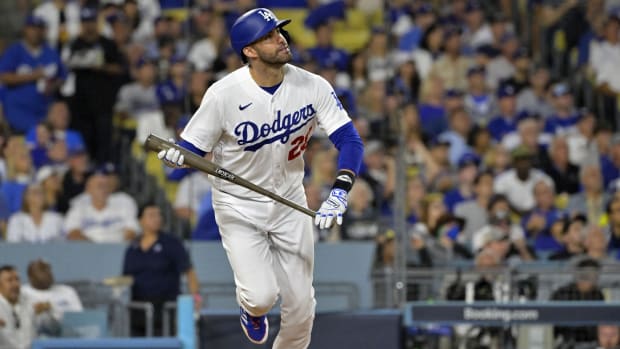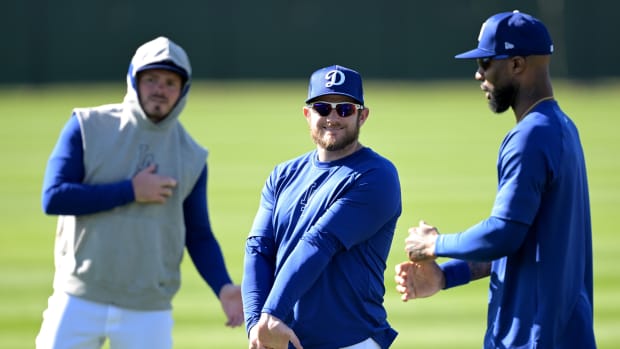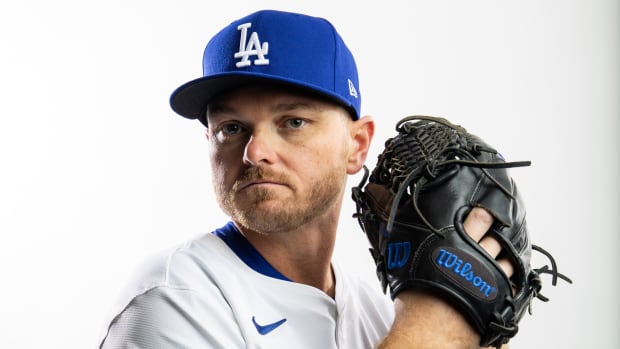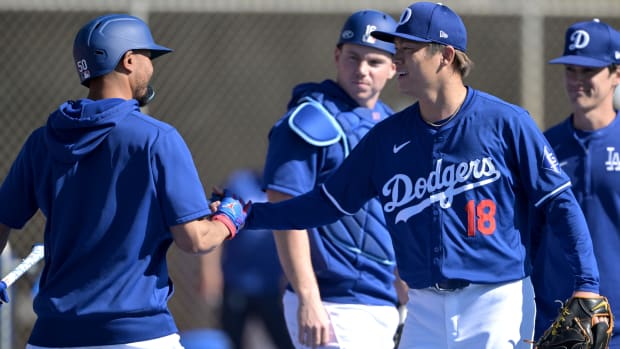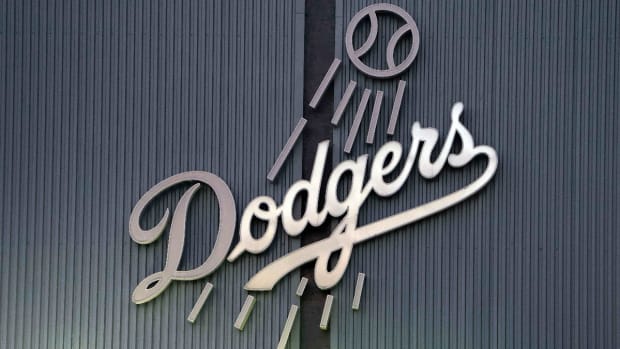Coming to Terms with the 2020 Season, for Better or Worse
Since joining Inside The Dodgers in late May, I have written 15 things for this site. Five of them (1, 2, 3, 4, 5), a full third, have focused on the dangers of conducting a Major League Baseball season during a pandemic and, both before and after a plan to play was in place, advocated for the cancellation of the 2020 season. As you read this, we are mere hours from the first pitch being thrown. Although the pandemic continues to get worse on a near-daily basis in the United States, so much so that the Toronto Blue Jays have been banned from bringing American teams into Canada, it seems that, at the very least, the season will begin as scheduled.
So what now?
One option is to boycott the season, to signal my disapproval by refusing to take part, to vote with my wallet against the playing of Major League Baseball during a pandemic. Such an action would be the easiest to justify in the abstract, but the reality of a boycott is that it would hurt me far more than it would influence Major League Baseball.
For one thing, with the ballparks closed to fans, there’s not much voting for my wallet to do. Per an email sent out by MLB in early July , the pro-rated portion of my MLB.tv subscription for this season amounts to amounts to just $45.18. The only official merchandise I buy are caps (mostly throwbacks through boutique shops), and it’s easy enough to hold off on a new cap purchase until November, even if I engage with the season as a fan and writer. My only other regular baseball purchases are books, few if any of which benefit MLB directly, and baseball cards, all of which I buy second hand. Yes, my clicks and views might help MLB’s ad sales, but I don’t know enough about when buys happen and prices change to know if MLB would even feel the effects of a sharp drop in ratings before the end of a 67-day season.
[Follow Sports Illustrated’s Inside the Dodgers on Twitter.]
More importantly, the thing that fills my wallet in the first place is baseball. This my job. I’ve been extraordinarily lucky to have made some portion of a living writing about baseball from home for almost a decade and a half now. The handful of you who have followed my career may have noticed that portion shrink in recent years. Four years ago, I was one of the lead baseball writers for SI.com. As the sports media industry has undergone rapid attrition, and Sports Illustrated has gone through multiple ownerships, I have slowly worked my way down to being a part-time guest columnist on a subsite of the content-mill version of that same site. Still, because of the pandemic, I’m thankful to still have a job I can do from home with zero human contact, and it would be irresponsible of me, as a father and husband, to throw that away for what would in all likelihood be an ineffectual protest.
If anything, I think I could do more good, certainly for my family, but also for the larger conversation around the 2020 season, by keeping my voice in the discussion. The reasoning here is similar to the one that returns to me whenever I contemplate a disastrous outcome in this November’s election. Maybe my family and I could attain a higher quality of life and greater peace of mind in another country where the standard of living is better due in part to the kinds of progressive policies that are repeatedly stymied here at home, but the United States is too large to leave behind. Because of its size, influence, and might, America’s policies and actions reverberate around the world, and it is easier to fight for progress from the inside, armed with citizenship and the vote, than from the outside.
The same logic applies to baseball. Major League Baseball is a $10 billion industry. It wouldn’t notice my absence as a fan or, frankly, a writer, but it might notice my presence if I continue to write here and anywhere else that will have me, continue to make my regular media appearances (including on KLAA 830 in Anaheim and the Infinite Inning podcast), and remain part of the conversation on twitter, amplifying not just my own voice but like-minded others, and in the baseball media community in general.
I also hold out hope that, much as I have been opposed to it because of the obvious public-health hazard it represents, the return of Major League Baseball can provide a more direct service than simply providing entertainment and a welcome distraction from the horrors of 2020. Specifically, MLB can, and I believe has an obligation to, go a long way toward helping to spread the word about safe and responsible practices during this pandemic, depoliticizing those practices by helping to establish them as norms that cross all demographic boundaries.
Having Dr. Anthony Fauci throw out the first pitch of the season Thursday night, which the Nationals will do, is the perfect place to start. MLB should build on that with a campaign of public service announcements about wearing masks, social distancing, and other safe practices, as well as efforts fans can make to help those hit hardest by the epidemic, emphasizing both the continued seriousness of the epidemic along with a positive message about how these actions can save lives and help speed our return to normalcy. Just imagine this sort of thing playing during every commercial break:
Beyond that, individual players should continue to take it upon themselves to speak up about these issues. Freddie Freeman, a 30-year-old in fantastic physical shape, spiked a 104.5 fever during his bout with COVID-19 and feared for his life. He needs to continue to tell that story to remind fans about the seriousness of the disease. Do it in a PSA about safe practices. Eduardo Rodriguez, a 27-year-old, was sick with the virus for more than a week and said it made him feel “100 years old.” Julio Teheran, 29, tried to isolate from his family after testing positive, but it spread to them anyway. Cubs pitching coach Tommy Hottovy, 38 when he had the virus earlier this year, was sick for a month and remained weakened by the disease even after testing negative. He has told his story, as have the others, but MLB needs to amplify those experiences to remind fans to take the epidemic seriously, and to counteract the impression that a return to baseball signals a return to normalcy.
Baseball and its employees can have a similar impact in smaller ways, by acting responsibly on the field and in the dugout, wearing masks, avoiding contact. Replace high-fives with foot and glove taps. Make these things the new normal, while the remaining abnormality of those actions, the empty stadiums, the Blue Jays playing in Pittsburgh (or Baltimore or Buffalo) can serve as a reminder that, as much fun as it may be to have baseball back, we are still a long way from normal or safe.
Maybe in those ways, the 2020 Major League Baseball season can help restrain the spread of the virus, rather than exacerbate it as I, and many others, have feared. If so, it would make it much easier to enjoy the game as a fan, and could even motivate the purchase of some MLB-licensed PPE (though it would be preferable if some portion of the profits from those masks went toward pandemic-related charities, which, best I can tell, is not the case as of yet).
If some or all of the above sounds like rationalization, that because it is, but this is not unfamiliar territory for baseball fans. Baseball often asks us to make difficult moral decisions. Unfettered enjoyment of the game requires turning a blind eye to cheating, doping, gambling, racism, misogyny, and a host of off-field issues from drunk driving to domestic violence.
I’d argue that the richer experience isn’t ignoring those issues, but understanding them, folding them into the larger story of baseball just as they are part of the larger story of America. To tell the story, we must tell it in full. From an activist perspective, you can’t make the future better by ignoring the past. You must understand the past, the totality of it, its transgressions and motivations, in order to create a future that can break free of that past. That also requires participation in the present.
Just as we can’t make the pandemic go away by ignoring it, we also can’t make change by disengaging. No matter how much we may want to erase things that have happened, if they happened, they happened. The 2020 season is happening, for better or worse, and it is both the present and, soon to be, a unique part of the history of something that I love (even if Rob Manfred is doing everything he can to try to make me stop loving it, from the Nike swoosh to the three-batter rule to, well, playing in a pandemic).
Even if I disapprove, I want to experience it. I want to be a part of the conversation around it. And, yes, when appropriate, I want to enjoy it. I hope it will be appropriate more often than not. Nothing would please me more about the 2020 MLB season than to be proven wrong about its dangers.
To that end, my focus in this space will be primarily on the game. I’ve said my piece about the decision to play. If events force me back to that topic, I won’t hesitate to go there, but in the meantime, I want to share in the enjoyment of baseball.
Not that I consider the 60-game season we’re about to experience anything more than an exhibition, but we can argue what that distinction really means as we go along. In the meantime, Baseball is kicking things off right with a competitive, “regular”-season matchup between Max Scherzer and the defending World Champion Nationals and Gerrit Cole and the Yankees Thursday night followed by the Dodgers’ home opener, started by newly-minted Black Lives Matter activist Clayton Kershaw, followed by a slate of 14 games, including another Dodgers-Giants game, on Friday.
I’m still not fully comfortable with all of that, but I can’t help but be at least as excited as I am trepidatious about it, and I see no reason to punish myself for that any more than I already have. For better or worse, the 2020 Major League Baseball season is upon us. Let’s make the best of it.
Cliff Corcoran covers baseball for The Athletic and is a former lead baseball writer for SI.com. The co-author or editor of 13 baseball books, including seven Baseball Prospectus annuals, he has also written for USA Today, SB Nation, Baseball Prospectus, Sports on Earth, The Hardball Times, and Boston.com, among others. He has been a semi-regular guest analyst on the MLB Network and can be heard more regularly on The Infinite Inning podcast with Steven Goldman. Follow Cliff on Twitter @CliffCorcoran.
